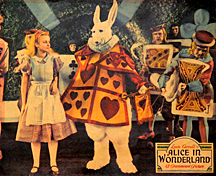 We’ll likely get around to catching Tim Burton’s new take on Alice in Wonderland eventually, but what we’re really excited about is the new DVD release of the 1933 version of Lewis Carroll’s classic work.
We’ll likely get around to catching Tim Burton’s new take on Alice in Wonderland eventually, but what we’re really excited about is the new DVD release of the 1933 version of Lewis Carroll’s classic work.
Directed by Norman McLeod with the invaluable creative input of art director, William Cameron Menzies, this Paramount release boasted a impressive roster of 1930s stars, among them Gary Cooper, Cary Grant, Mae Marsh, W.C. Fields, Edna May Oliver, Richard Arlen, May Robson, Sterling Holloway, Edward Everett Horton, Polly Moran, Charles Ruggles, and Ned Sparks.
Dave Kehr of The New York Times wrote of the Paramount Alice, “Seen today, it’s still a profoundly creepy experience. This Wonderland is not the proto-psychedelic playground of the 1951 Disney animated version, but a distorted, claustrophobic environment populated by menacing, bizarre figures.”
Kehr goes on to say, regarding the movie’s special effects, “As dazzling as today’s digital effects can be (and Mr. Burton’s Cheshire Cat is sure to be memorable), we remain all too aware of how they are accomplished (computers!) for them to possess the seductive sense of mystification that Menzies and McLeod achieve here, using practical techniques derived from Victorian stage magic.”
We couldn’t agree more. We have just about had our fill of today’s CGI effects — give us some old-fashioned, hand-crafted movie magic.
The 1933 Alice also has the exclusive distinction of having garnered an enthusiastic thumb’s-up from the very woman who, as a young girl, inspired Carroll’s stories.
As Kehr writes…
In a Jan. 7, 1934, article in the Times, Alice Liddell, quoted under her married name, Mrs. Reginald Hargreaves, expressed admiration for the film that Hollywood had wrought from the story Carroll had invented for her some seven decades before.
“I am delighted with the film and am now convinced that only through the medium of the talking picture art could this delicious fantasy be faithfully interpreted,” she declared, her words possibly burnished by a Paramount publicist. “‘Alice’ is a picture which represents a revolution in cinema history!”
That’s good enough for us! Our copy of the dvd is already on order and will soon be winging its way to us.
Mr. Burton’s picture may just have to wait a while for our patronage, while we savor a 1930s classic.
